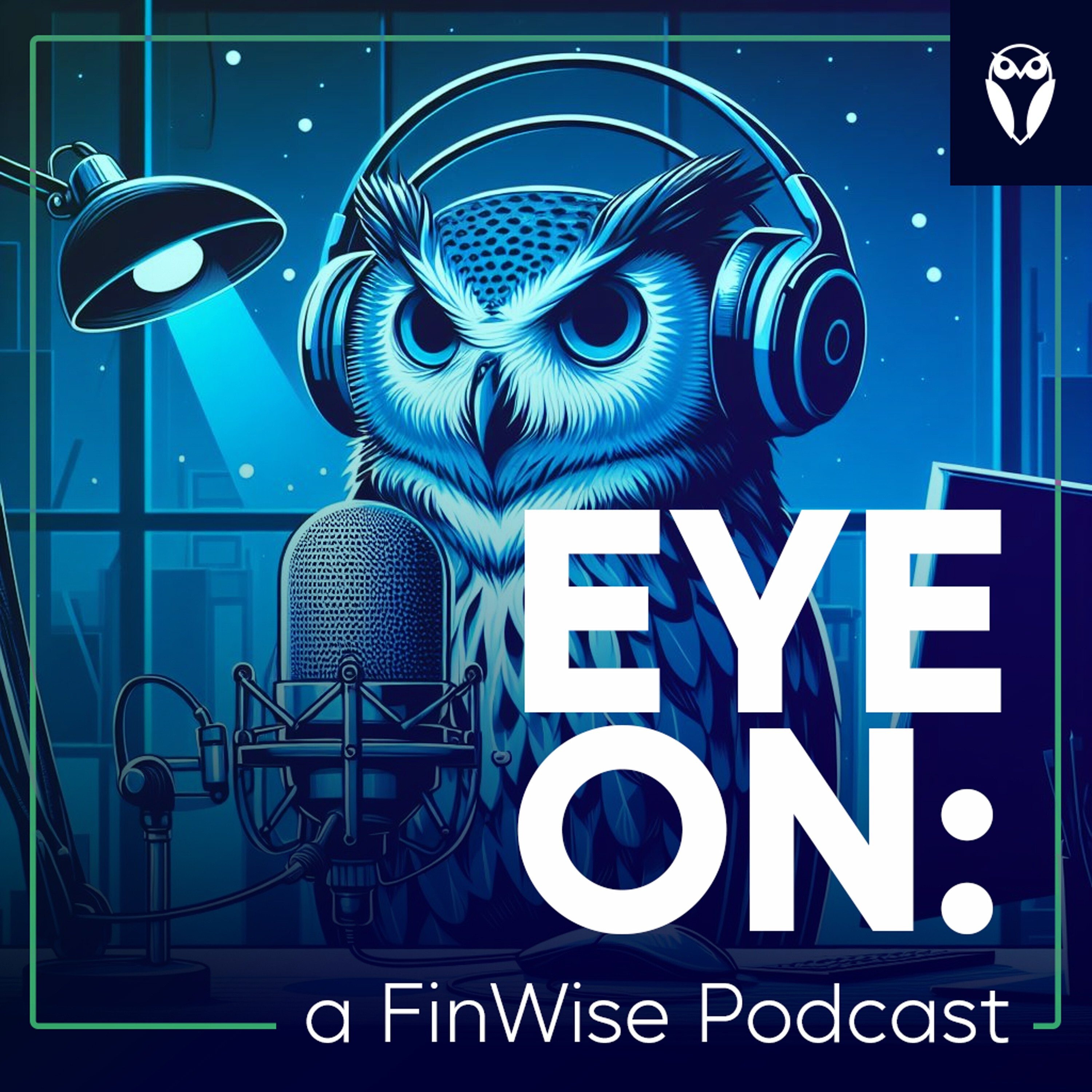Wednesday Jan 22, 2025
The Evolving Role of Sponsor Banks in Fintech with Visa's Brittany Decker
Episodes
Episodes
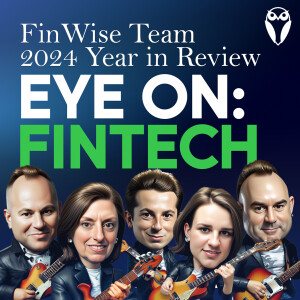


Tuesday Jan 07, 2025
FinWise Team 2024 Year in Review
Tuesday Jan 07, 2025
Tuesday Jan 07, 2025
In this special edition of the FinWise EYE ON: podcast, the team reflects on the tumultuous year of 2024, discussing key themes such as the impact of consent orders, the evolving relationship between banks and fintechs, and the importance of compliance and risk management. They share insights on best practices for fintechs seeking bank partnerships and the role of technology in enhancing compliance efforts. Looking ahead to 2025, the conversation emphasizes the need for a strong foundation in compliance and the potential for innovation in the banking sector.
FinWise Team:
Sarah Grotta - Deputy Chief Fintech Officer
Nick Chiappetti - VP, Fintech Marketing and Partnerships
Kenzie Mexican - Deputy Chief Compliance and Risk Officer
Simon Darchis - Head of Fintech Products and Strategic Initiatives.
Nathan Mills - VP, Corporate Marketing and Communications
Takeaways
2024 was marked by significant regulatory scrutiny in the fintech space.
Consent orders were prevalent, highlighting the need for better compliance practices.
The relationship between banks and fintechs is evolving towards more stringent oversight.
Fintechs must prioritize compliance in their business plans to succeed.
Education and understanding of risks are crucial for fintechs seeking bank partnerships.
Technology can enhance compliance efforts but should not replace human oversight.
The industry is maturing, with a focus on sustainable practices and risk management.
Future fintech products must adapt to the preferences of Gen Z consumers.
Collaboration between banks and fintechs is essential for navigating regulatory challenges.
The future of banking as a service looks promising with opportunities for innovation.
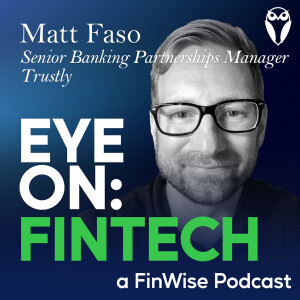


Monday Dec 16, 2024
Navigating the 1033 Rule: Opportunities and Challenges - Matt Faso, Trustly
Monday Dec 16, 2024
Monday Dec 16, 2024
In this podcast episode, Sarah Grotta and Matt Faso discuss the recently finalized 1033 rule, which focuses on open banking and data privacy in the U.S. They explore the origins of the rule, its core principles, and the changes from the proposed to the final version.
The conversation highlights the compliance timelines for financial institutions, the interplay between the 1033 rule and state privacy laws, and the requirements for data sharing among financial institutions and third parties. The episode emphasizes the importance of consumer choice and security in the evolving landscape of open banking.
In this conversation, Matt Faso discusses the complexities and implications of the new consumer data sharing rules set by the CFPB. He highlights the challenges consumers face with data reauthorization, the vagueness of the rules, and the compliance requirements for financial institutions and third parties. The conversation also touches on enforcement uncertainties and the potential for future expansions of the rule.
Takeaways
The 1033 rule is a significant step for open banking in the U.S.
Consumers have the right to access and share their financial data.
The rule aims to promote innovation and competition in banking.
Data providers cannot charge for access to consumer data.
The final rule provides more clarity on compliance timelines.
There is a strong emphasis on consumer privacy protections.
The rule encourages the use of secure APIs over screen scraping.
Financial institutions must comply with both federal and state privacy laws.
The anti-evasion rule could prevent data access barriers.
The rule aims to make switching financial providers easier for consumers.
Reauthorization of consumer data can lead to significant consumer harm.
The CFPB's vagueness in the rule creates uncertainty for stakeholders.
Clarity on compliance timelines is essential for data recipients.
Data providers can deny access if data recipients are non-compliant.
The rule lacks specific monetary penalties for violations.
Third parties must maintain robust data security policies.
The rule supports the pay by bank model but has limitations.
The CFPB aims for the rule to be a starting point for future developments.
The political landscape may affect the enforcement of the rule.
Future expansions of the rule are uncertain under the new administration.
Slide summary PDF of Matt's information from this episode
https://www.trustly.com/
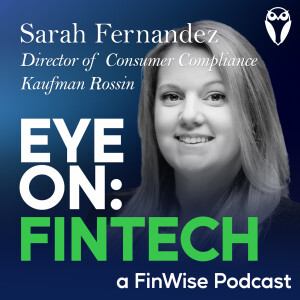


Tuesday Nov 19, 2024
Common Pitfalls in Reg E Compliance - Sarah Fernandez, Kaufman Rossin
Tuesday Nov 19, 2024
Tuesday Nov 19, 2024
In this podcast episode, Sarah Grotta and Sarah Fernandez discuss the critical importance of Regulation E (Reg E) in the banking and fintech sectors. They explore the challenges financial institutions face in compliance, the role of technology in dispute resolution, and best practices for managing partnerships with fintechs. The conversation also highlights common errors in Reg E compliance and emphasizes the need for consumer protection in dispute management. As new payment technologies emerge, the discussion underscores the importance of adapting compliance strategies to ensure consumer rights are upheld.
Takeaways
Reg E is essential for consumer protection in banking.
Financial institutions must understand compliance challenges.
Technology can streamline dispute resolution processes.
Onboarding fintech partners requires thorough due diligence.
Reg E compliance is evolving with new payment technologies.
Testing and documentation are crucial for compliance.
Common errors include misunderstanding timing requirements.
Consumer communication is key in dispute management.
Financial institutions should monitor for potential fraud.
Continuous improvement in compliance processes is necessary.
Kaufman Rossin
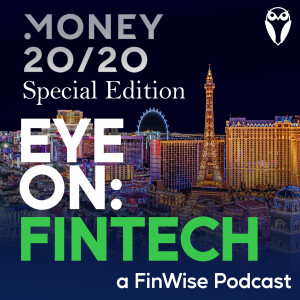


Thursday Nov 07, 2024
What are industry experts saying about financial trends and the future of fintech?
Thursday Nov 07, 2024
Thursday Nov 07, 2024
Join us for an EYE ON Podcast with our special guests, all industry leaders, who stopped by our FinWise satellite office during our time at Money20/20, one of the world’s largest fintech events, to give us their insights into top trends, current state of fintech and bank partnerships, financial inclusion, and emerging technologies shaping the future of embedded finance and the fintech industry. There is palpable excitement for the possibilities in the fintech industry shared in this special podcast edition.
Money20/20 Guests
Such Patil, Head of Partnerships, and Alli Nilsen, Senior Strategic Partnerships Manager, Lithic (:30 – 8:33)
Glenn Murray, Chief Strategy Officer, DreamFi (8:35 – 13:50)
Taylor Cembalist, Director of Customer Success and Partnerships, NetXD (13:52 – 18:13)
Krishnan Gopalakrishnan, Co-Founder and CEO, Plannery, and Andrew First, Co-Founder and CTO, Plannery (18:15 – 23:37)
Sonja McIntosh, Vice President of Operations, DreamFI (23:39 – 24:37)
Lee Easton, President, iDentify (24:39 – 31:08)
Brittany Decker, Sr. Director, Head of Sponsor Banks, Visa (31:10 – 45:54)
Shawn Ghuman, Enterprise Sales Lead, Sardine (45:56 – 51:24)
Nicola Morris, COO, Highnote (51:26 – 55:12)
Nathan Lemon, Head of Partnerships, IC Group (55:14 – 59:22)
Stewart Watterson, Strategic Advisor, Datos Insights (59:24 – 65:11)
David Ritter, CEO, Privacy Lock (65:13 – 70:30)
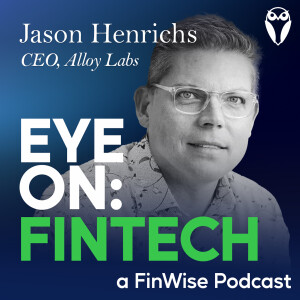


Monday Oct 21, 2024
Monday Oct 21, 2024
Summary
In this episode of the EYE ON: podcast, Robert Keil speaks with Jason Henrichs from Alloy Labs about the evolving landscape of community banking. They discuss the challenges and opportunities faced by community banks in a digital-first world, the importance of technology and data, and strategies for competing against larger banks. Jason shares insights on how community banks can leverage partnerships, innovate, and navigate regulatory challenges to thrive in the future.
Takeaways
Jason Henrichs has 30 years of experience in financial services.
Community banks excel in small business lending but struggle with deposits.
Banking as a service offers community banks a competitive edge.
Community banks should redefine their market beyond geography.
Investing in technology is crucial for future growth.
Data availability and payment systems are essential for success.
Hope and prayer are not viable strategies for community banks.
Community banks need to focus on unique niches to thrive.
Collaboration among banks can lead to shared knowledge and success.
Regulatory challenges require proactive engagement and data-driven solutions.
https://www.alloylabs.com/
https://www.linkedin.com/in/jasonhenrichs/



Monday Sep 30, 2024
Monday Sep 30, 2024
In this episode of the FinWise EYE ON: podcast, host Juan Arias our Head of Corporate Development & Investor Relations, sits down with Jason Mikula, an authority in the fintech banking industry and head of industry strategy for banking and fintech at Taktile. An insightful discussion for equity investors and industry participants to help them understand the current state of the fintech-banking partnership industry, the evolution of technology in banking, regulatory challenges, and the differentiation between fintechs and traditional banking institutions. Jason shares his insights on recent regulatory actions, compliance investment, the broader impacts of fintech in the financial sector, and offers advice for investors evaluating fintech and banking stocks.
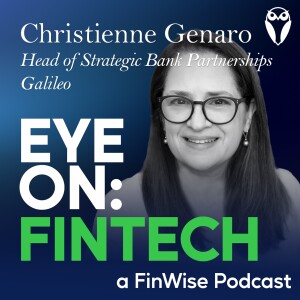


Monday Sep 16, 2024
Matching a Fintech Program to the Right Sponsor Bank - Christienne Genaro
Monday Sep 16, 2024
Monday Sep 16, 2024
In this episode, Sarah Grotta, Deputy Chief Fintech Officer at FinWise Bank, discusses the concept of a backup bank with Christienne Genaro, who manages bank partnerships at Galileo. They explore the role of bank partnerships in the fintech marketplace and the importance of compliance in these relationships. They also discuss the process of finding the right sponsor bank for a fintech and the shift in use cases, including cross-border solutions and embedded finance.
The conversation highlights the need for alignment between fintechs and banks on BSA and reporting, as well as the shift away from the interchange business model. They emphasize that a backup bank is not just a backup prom date, but a strategic partnership that requires careful consideration and preparation. They also explore the idea of banks forming backup bank coalitions to provide customers with alternative options.
The conversation touches on the factors that may prompt a fintech to seek a second bank, such as the need for diversification and the changing regulatory landscape. They also discuss the importance of building strong relationships between issuers, processors, and banks to ensure success.
Takeaways
Bank partnerships play a crucial role in the fintech marketplace, and finding the right sponsor bank is essential for fintech success.
Compliance is a key consideration in bank partnerships, and fintechs should seek sponsor banks that are reg savvy and have a good relationship with regulators.
Fintechs are exploring new use cases, including cross-border solutions and embedded finance, as they expand their product offerings.
Alignment on BSA and reporting is crucial for fintechs and banks to ensure a successful partnership.
The marketplace is shifting away from the interchange business model, and fintechs are looking for sustainable revenue streams beyond interchange fees.
Processors like Galileo can help fintechs find the right sponsor bank by providing curated lists and facilitating introductions. Having a backup bank is not just a backup prom date, but a strategic partnership that requires careful consideration and preparation.
Banks may form backup bank coalitions to provide customers with alternative options.
Factors that may prompt a fintech to seek a second bank include the need for diversification and the changing regulatory landscape.
Building strong relationships between issuers, processors, and banks is crucial for success in the fintech industry.
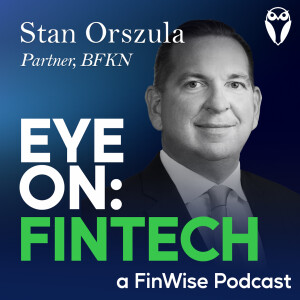


Tuesday Sep 03, 2024
How Do Fintechs Become Sponsor Bank Ready? - Stan Orszula
Tuesday Sep 03, 2024
Tuesday Sep 03, 2024
In this episode, Sarah Grotta interviews Stan Orszula, a partner at BFKN, about the future of banking and the role of fintechs. They discuss how fintechs are an extension of what community banks do, offering specialized services to different communities. They also explore the challenges and opportunities for community banks in partnering with fintechs, the importance of regulatory oversight, and the need for preparedness and education in the fintech industry. They touch on topics such as BSA/AML processes, broker deposits, backup banks, and potential future regulations.
Takeaways
Fintechs are an extension of what community banks do, offering specialized services to different communities.
Community banks can benefit from partnering with fintechs to stay relevant and provide innovative solutions.
Regulatory oversight is crucial in fintech-bank partnerships, especially in areas like BSA/AML processes.
Fintechs should be prepared, educate themselves about the regulatory environment, and seek guidance from experienced professionals.
Backup banks and contingency plans are important for fintechs and banks to ensure smooth transitions and protect end users.
Future regulations may focus on areas like FBO accounts and broker deposits.
Mentioned in this episode:
Third-Party Relationships: Interagency Guidance on Risk Management: https://www.occ.gov/news-issuances/bulletins/2023/bulletin-2023-17.html
